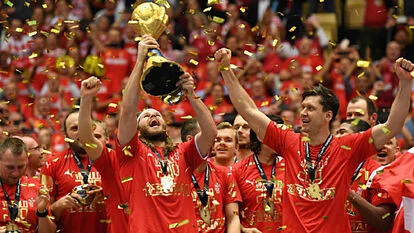The 2021 IHF World Men’s Handball Championship, held in Egypt from January 13 to January 31, 2021, marked a historic milestone as the first tournament to feature 32 teams, up from 24 in previous editions.
Since its inception in 1938, when Germany won the inaugural title among four European teams (Germany, Austria, Sweden, Denmark), the championship has grown to include nations from Africa, Asia, and the Middle East.
Hosted across four venues in Cairo and Alexandria, the tournament faced strict Covid-19 protocols, including closed hotels, regular testing, and no spectators for all 108 matches, reflecting the global pandemic’s impact, with over 95 million cases worldwide by January 2021.
Tournament Format
The 32 teams were divided into eight preliminary round groups (A to H), with the top three from each advancing to the main round, forming four groups of six.
Results against qualifying teams carried over, and the top two from each main round group progressed to the quarter-finals, where the competition became a knockout format.
Teams finishing last in the preliminary round competed in the President’s Cup for lower placings.
This expanded structure aimed to increase global participation, though challenges like withdrawals and Covid-19 cases tested its implementation.
Covid-19 Challenges
The tournament faced significant disruptions due to Covid-19. The United States withdrew from Group E after 18 players and their coach tested positive, with Switzerland stepping in as a last-minute replacement.
Similarly, the Czech Republic pulled out after three coaches and 13 players contracted the virus, and North Macedonia filled their spot in Group B.
These changes underscored the pandemic’s toll, with Egypt reporting over 150,000 cases by January 2021, prompting stringent measures like closed-door matches and isolated accommodations.
Favorites and Key Matches
France, with four titles since 2009, opened their campaign in Group E against Norway on January 14 in 6th of October City. Coach Guillaume Gille stressed the need for improvement, telling the FFHandball website, “We need to be tighter in defence and more efficient in the scoring area.” France also faced Austria and Switzerland.
Defending champions Denmark, who defeated Norway in the 2019 final, began their title defense against Bahrain in Cairo, joined by favorites Croatia and Germany.
Germany, however, was without nine key players, including THW Kiel’s Patrick Wiencek, who cited family and health concerns, stating, “This was one of the hardest decisions of my sporting life but with all that’s going on, it just didn’t feel right to be away from home for four weeks.”
African and Global Representation
Egypt, as hosts, led Africa’s challenge alongside Algeria and Tunisia, with the continent allocated one performance spot based on the 2019 championship. Qatar, the only non-European team to reach a final (2015), represented Asia, while Brazil and Argentina carried South America’s hopes.
Guinea’s debut and the return of teams like Cuba and Kuwait since 2009 highlighted the tournament’s growing diversity.
However, the absence of Oceania teams, with no top-five finish in the Asian Championship, led to two IHF wildcards, one awarded to the United States (later withdrawn).
Context and Impact
The 2021 championship, the first major global sporting event of the year, navigated a delicate balance between competition and safety, with the sports industry facing $18 billion in losses due to Covid-19. Denmark ultimately won the title, defeating France 35-33 in the final, while Egypt reached the quarter-finals, their best performance since 2001.
Posts on X in 2021 noted the “resilience” of teams like Egypt, despite the “eerie” atmosphere of empty arenas. The tournament set a precedent for future expansions, with the 2025 edition later adopting the same 32-team format across Croatia, Denmark, and Norway.






